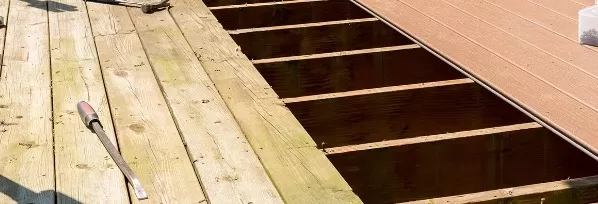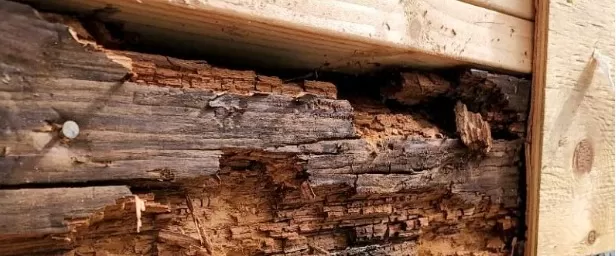Age, material, and wear and tear are key factors in deciding whether to repair or replace your deck. These tips will guide your decision-making process.
Assessing the Age and Material of Your Deck: Repair or Replace?

Consider the deck’s age.
- Lifespan of traditional wood decks: Traditional wood decks typically have a lifespan of 10 to 15 years. Factors such as maintenance, exposure to the elements, and the type of wood used can affect the longevity of a wood deck.
- Extended lifespan of composite decking: Composite decking offers a longer lifespan compared to traditional wood decks. It can last anywhere from 20 to 25 years, depending on the quality of the composite material and proper maintenance.
- Longevity of polymer decks: Polymer decks, particularly capped polymer, have an even longer lifespan. These decks can stay in decent condition for up to 50 years. Capped polymer decking is highly durable, resistant to moisture, fading, and staining, making it a long-lasting option for decking.
- Importance of considering material and age: Understanding the material and age of your deck is crucial in determining whether to replace the entire deck or opt for repairs. Wood decks nearing the end of their lifespan may require more extensive repairs or replacement, while composite and polymer decks offer the potential for longer-term use before major renovations are needed.
Assessing Deck Condition: Inspecting for Damage and Wood Rot

Inspect the main areas of the deck.
Before deciding on DIY repairs or calling a professional, conduct a thorough inspection of your deck.
Check the ledger board, beams, joists, fascia board, posts, flashing, railing, and the deck’s surface for any signs of damage or deterioration.
Signs of wood rot indicate potential deck replacement.
Wood rot poses a significant risk to the structural integrity of a deck.
Look for soft, darkened timber or the presence of fungus growth, as these are clear indications of wood rot. Horizontal beams, joints, and fascia boards are particularly susceptible to rot.
Extensive wood rot in multiple areas may require a complete deck replacement.
Consider the cost of rebuilding.
If multiple areas of the deck show signs of damage or wood rot, it’s important to evaluate the overall cost of repairing versus rebuilding the deck.
Extensive damage in various components may make rebuilding a more practical and cost-effective solution in the long run.
Remember, conducting a thorough inspection and consulting with a professional can provide a clearer understanding of the extent of the damage and help you make an informed decision about whether to repair or replace your deck.
Seeking Professional Guidance for Deck Repairs and Replacement

Getting a quote from a deck installer
If you’re uncertain about whether to repair or replace deck components, consulting a professional deck installer is highly beneficial.
They possess the expertise to assess the condition of your deck and provide insights on the best course of action. A deck installer can offer an estimate for the cost of repair or replacement, suggest alternatives like deck resurfacing, and provide a timeline for when a replacement may be necessary.
Hiring a professional for deck repairs
While some may consider DIY repairs, enlisting the services of a professional ensures efficient and safe results. Deck replacement or major repairs demand specialized tools, time, and expertise that professionals possess. They can effectively handle complex deck structures and minimize the risk of mistakes that could compromise safety.
Investing in a professional guarantees the longevity and safety of your deck for years to come.
By seeking the assistance of a professional deck installer, you can make well-informed decisions regarding the repairs or replacement needed for your deck.
Their expertise ensures that the job is completed with utmost efficiency and in compliance with safety standards, providing you with a sturdy and durable deck.
*The information is for reference only.